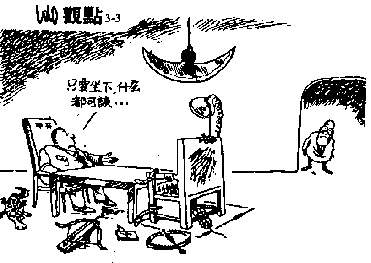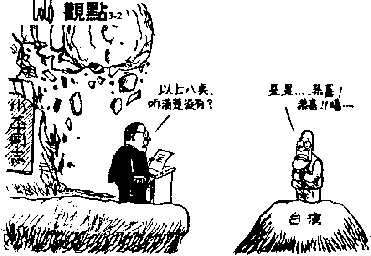 Taiwan Communiqué
No. 65, April 1995
Taiwan Communiqué
No. 65, April 1995 Taiwan Communiqué
No. 65, April 1995
Taiwan Communiqué
No. 65, April 1995During January and February 1995, the question of copyrights and intellectual property rights was high on the agenda between the US and China. The problem was that rampant Chinese piracy of American computer software, music CDs, videos and movies was costing the American software, music and movie industry billions of dollars annually.
In an attempt to enforce copyrights, the US threatened trade sanctions amounting to some US$ one billion / year against China, and set a February 26th deadline. In the end, the two sides came to an accord, and China reportedly agreed to clamp down on pirate manufacturers of CDs and to start abiding by international copyright agreements. The accord had a price for the US too: according to news reports China insisted that the US support China's application as a founding member of the World Trade Organization. On 12 March 1995, US Trade Representative Mickey Kantor stated that the US would do so.
The US firmness on the economic front was combined with a new willingness of the Clinton Administration to take China to task on the issue of human rights. In its annual Human Rights report, made public in the beginning of February 1995, the State Department concluded that during the past year there was ``no significant, concrete improvement in China's human rights record.''
In the beginning of March 1995, at the annual meeting of the 53-member UN Human Rights Commission, the US also backed a European draft resolution, which expressed concern at continuing reports of violations and severe restrictions of fundamental freedoms. Regrettably, the resolution was narrowly defeated by a 21-20 vote, after China strenuously lobbied against it.
Taiwan Communiqué comment: While we welcome the renewed attention given by the US to human rights in China, the overall picture of US policy towards China is still fuzzy. The 15-month old policy of the Clinton Administration is termed Comprehensive Engagement, but it ends up more like a hodge-podge of uncoordinated events, often in contradiction with each other. Sending Hazel O'Leary to China to sign energy contracts at the time when the US Trade Representative was going through its final round of trade negotiations, and US defense officials cozying up to the Peoples Liberation Army while the State Department was trying to tackle human rights are just a few of them.
On 30 January 1995, on the eve of lunar New Year, Mr. Jiang Zemin, who serves both as China's President and general secretary of the Communist Party, gave a speech in Peking which was heralded by the Chinese authorities as a ``major new initiative.'' The speech, titled ``Continue to promote the reunification of the motherland'' contained eight points, which we briefly summarize below:

One of the best comments on Mr. Jiang's speech in the international press was given by Mr. Frank Ching in the Far Eastern Economic Review (Jiang Zemin goes fishing, 2 March 1995), who concluded that the overture is a sinister ploy to lure Taiwan into a dialogue.
Mr. Ching states that if Taipei accepts Jiang's premises, the game is over. He concludes: ``China is not about to give away anything basic, while what it wants from Taiwan is nothing short of total capitulation.''
The Taipei authorities themselves reacted in a muddled fashion: on 30 January 1995, an official of Taipei's Mainland Affairs Council stated that ``There is nothing new in Jiang's words. They lack constructiveness and do nothing for the development of relations between the two sides.''
This line was reiterated on 6 February by a spokesman of the Kuomintang party, who said: ``Their way of speaking has changed ... it is less rigid than before, but that does not necessarily mean they have changed their way of thinking: they are trying to hide their old intentions.'' However, on the same day, president Lee Teng-hui stated that the offer was important and should be considered carefully.

Mr. Jiang's words indeed proved to be a slick facade: on 24 February 1995, Taiwan's Chief of General Staff Liu Ho-chien disclosed that just at the time of Jiang Zemin's speech, China secretly moved two missile contingents and M-class missile bases from Kiangsi Province to Fukien Province, across the Strait from Taiwan. The range of the missiles is 1000 miles, bringing Taiwan within easy range.
Taiwan Communiqué comment: Mr. Jiang's Eight-point proposal is old wine in a leaky bottle: it reiterates the old and unworkable ``one country, two systems'' proposal and adds some reasonably-sounding noises. However, the essence of the matter has not changed, and Mr. Jiang fails to recognize the reality that the Taiwanese people have developed their own identity, and do not consider themselves Chinese, just as Americans do not consider themselves British subjects anymore.
The reality is that Taiwan and China are light-years apart in terms of economic development (Taiwan has a per capita GDP of approximately US$ 12,000, while China is lingering below US$ 400), social development, and culture. Against the background of these tremendous differences and in view of the achievements of the Taiwanese people in terms of the political and human rights, trying to force Taiwan into the ``embrace of the motherland'' is neither right, rational nor reasonable.
Mr. Jiang's assurances that ``Chinese not fight fellow Chinese'' sound very hollow, certainly after the bloody crackdown of Tienanmen in 1989. His promise that China will respect the life-style, the legitimate rights and interests of the 21 million compatriots in Taiwan, is totally incredible in view of the lack of human rights in China itself, the Chinese repression in Tibet, and the repeated attempts by China to stifle freedom of the press, speech and political expression in Hong Kong.
The new reality is that Taiwan is already a de-facto independent country, and that China's railings against Taiwan independence only prevent the development of a peaceful solution to the problem across the Taiwan Straits.
If China seriously wants to move towards accommodation with Taiwan it needs to recognize Taiwan as a friendly neighbor, which deserves a full place under the international sun. China's attempts to block Taiwan membership in the United Nations and other international bodies need to be stopped.
During the past few months, a number of American studies and articles in the international press focused on what could happen in China after the death of Deng Xiaoping. The press articles were spurred by reports that Mr. Deng's health was deteriorating. In a particularly candid interview with the New York Times (13 January 1995) Mr. Deng's daughter, Deng Rong, stated that Mr. Deng's health was ``declining day by day'' and that he was unable to stand or walk.
The study that received most attention was a Pentagon-commissioned study titled ``China in the Near Term.'' It was performed during the summer of 1994, but was not made public until the end of January 1995. The study concluded that there is ``...a 50/50 chance that the current transition period will lead to a Soviet-style break-up of China.''
The Pentagon study states that such a break-up may not occur immediately, but that tensions caused by regional and factional fighting may remain below the surface for some time, and not come to a boiling point until anywhere from one to several years later. In such a scenario, a successor who initially seems to have the upper hand, such as Mr. Jiang Zemin, will eventually give way to other power contenders.
Other analysts, such as David Shambaugh of the London School of Oriental and African Studies (Beyond China's deathwatch, a future to worry about, International Herald Tribune, 21-22 January 1995) agree that in contrast to the succession struggle after the death of Mao in 1976, ``...the succession to Mr. Deng is likely to be smooth in the near term. The situation six months or a year later is less predictable.''
In his article, Mr. Shambaugh identifies a number of power contenders, who are likely to attempt to wrestle power away from the present President and Communist party general secretary Jiang Zemin. He concludes: ``China is in many ways a tinderbox that needs only a match, and deaths of senior leaders have provided such ignition in the past. If China erupts after Mr. Deng dies, and authoritarian retrenchment and the spilling of blood to maintain the part in power are a far more likely scenario than the blossoming of Chinese democracy.''
Another prominent analyst, Mr. Philip Bowring gives a slightly less negative appraisal, but only very slightly so (In China After Deng, It appears the successor may be bureaucracy, International Herald Tribune, 22 March 1995). Mr. Bowring describes the contending forces and concludes: ``...the complexity of the cross-currents makes a repeat of the post-Mao scenario unlikely. Some heads will roll and some purges will occur, as they always do when the guard changes. But the future looks more like Moscow after the passing of Nikita Khrushchev -- a dreary but unalarming thought.''
Taiwan Communiqué comment: Whichever way China goes, it is an unattractive prospect for Taiwan to ``unify'' with. Some American academics and observers in the press have been arguing that under the present sensitive circumstances one should not ``provoke'' China by pushing for President Lee Teng-hui's visit to Cornell University or for Taiwan's membership in the UN (see Republicans may hurt Taiwan by trying to do it favors, Business Week, 27 February 1995).
We argue that the views of the Chinese leadership (and of some American academics) are still mired in the old Chinese Civil War conflict with the Kuomintang. However, a new reality has evolved, in which -- in the course of the past four decades -- the people of Taiwan have achieved a new entity Taiwan, with its own territory, people, and government. This new Taiwan deserves to be fully accepted in the international community.
It is essential for the Kuomintang authorities to move away from their old ``Republic of China'' syndrome, and to take decisive steps towards this new reality. They will find that once they do that, Taiwan will be met with increasing international recognition. In due time, China will learn to live with this reality, and will actually find that coming to an accommodation with Taiwan is in its own benefit.
We are convinced that downplaying the new Taiwan reality for fear of provoking China would be severely detrimental to stability in East Asia, since it would actually encourage China to continue its extra-territorial claims in the same way as UK Prime Minister Chamberlain 1938 ``Munich Accord'' encouraged Hitler to continue claiming neighboring countries, such as Czechoslovakia, the Netherlands and Belgium (which were invaded not long after ``Munich'').
For the Taiwanese people, the matter is highly sensitive too: our future as a free, democratic and independent nation is at stake.
Back to: Table of Contents
Copyright © 1995 Taiwan Communiqué